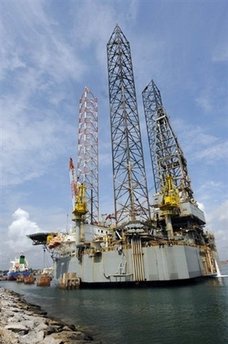Ghana’s oil output constitutes 0.1 percent of the world’s total production, far behind production levels of major oil-producing countries such as Saudi Arabia, Iran and Kuwait as well as Norway and Canada.
Ghana produces 80,000 barrels of crude oil daily as against 2.5 million barrels produced daily by Nigeria and Angola, two African countries which are members of Organization of Petroleum Exporting Countries (OPEC).
To this end, Joseph Owusu, a member of the EO Group, one of the partners that discovered oil in the country, said the nation requires massive investments as well as technology and training to increase the current oil production to 400,000 barrels a day.
“To be able to match up to 0.5 percent by 2015, Ghana would have to produce 400,000 barrels per day, only then would we begin to make significant contribution to global crude and energy demand.”
Addressing the media and stakeholders at a colloquium to mark the first anniversary of Ghana’s oil production, Mr. Owusu, General Manager of the EO group, said the country will have to increase its production level to 500,000 barrels a day if it wants to become a bigger player and a member of OPEC in the future. “If we really want to move from 0.1 percent to 0.5 percent it requires major investments in upstream activities, it will bring a change in economic activities.”
He added that it takes between $60 million and $100 million to drill one well with regard to offshore exploration.
He commended Tullow Oil for setting a record in oil production, saying, “I thought Ghana’s first oil production was going to start in 2012.”
He also highlighted the risks in the oil sector and called for consolidated efforts by stakeholders and the media to bring in more investors into the country.
“We need to explore the oil potential to the fullest. There must be laws favorable to investors to come and take part in the oil exploration.”
Commenting, Ransford Tetteh, President of the Ghana Journalists Association (GJA), challenged the media to reassess issues such as the local content policy, among other pertinent issues.
Other issues discussed at the colloquium included the role of the media as a crucial partner in realizing the full potential of Ghana’s oil production, the economic and social impact of the oil find on Ghana’s economy and positioning local industries to benefit from the oil.
Meanwhile, OPEC says its 12 oil ministers have agreed to keep the organization’s output at 30 million barrels a day.
A statement said that the agreement includes a voluntary commitment by producing nations to lower output if world demand for crude drops.
The result of Wednesday’s meeting was widely anticipated. Iran sought lower production to raise prices, but it apparently succumbed to Saudi Arabia, the largest producer, which wanted to maintain levels.
OPEC member countries include Iran, Iraq, Kuwait, Saudi Arabia, Venezuela, Qatar and Indonesia. Others are Libya, the United Arab Emirates, Algeria, Nigeria and Angola.
General News of Sunday, 18 December 2011
Source: Daily Guide
Ghana’s Oil 0.1 % Of World Output













